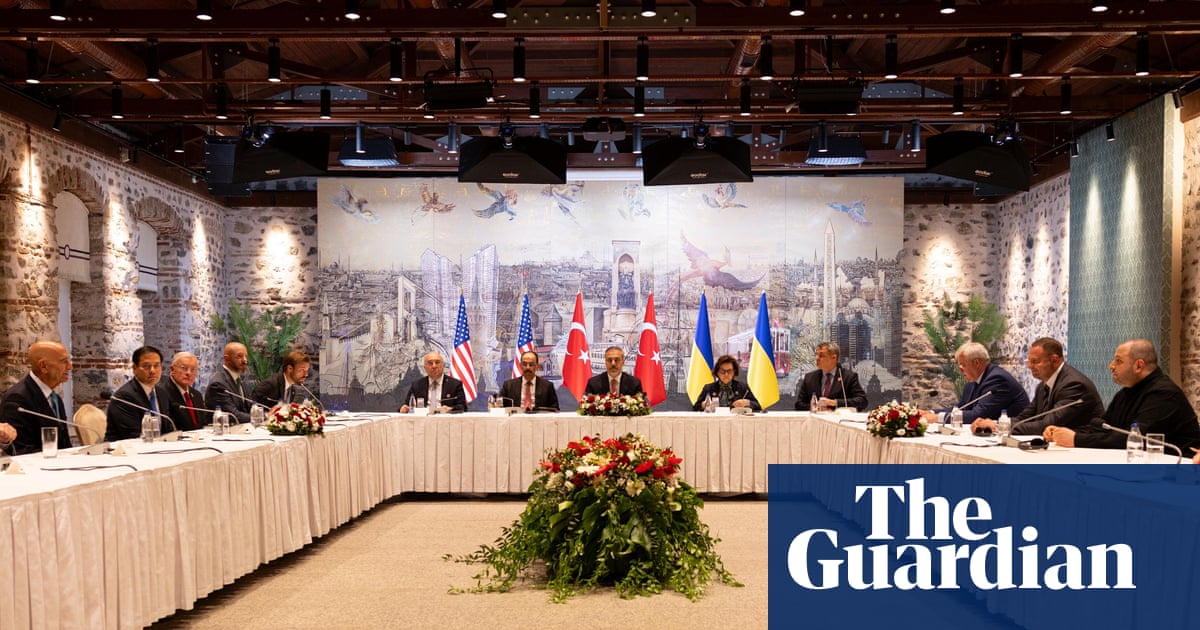Russian and Ukrainian officials opened direct peace talks in Istanbul on Friday – without Vladimir Putin orVolodymyr Zelenskyy– for the first time in more than three years, but hopes for any meaningful breakthrough are limited.
Images from the meeting held at the Dolmabahce Palace were stark: a row of Russian delegates in dark suits and opposite them Ukrainians wearing their trademark green camouflage combat fatigues.
Before the meeting, the Turkish foreign minister, Hakan Fidan, addressed Russian and Ukrainian negotiators at the palace on the Bosphorus. “There are two paths today: one leads to peace, and the other will cause more destruction and loss of life. Both sides will choose which path to take,” he told the negotiating teams.
The talks began 24 hours later than planned after a day of confusion and political theatrics.
Putin, who had initially proposed the meeting, opted not to travel toTurkeydespite Zelenskyy’s public challenge to meet him face to face. Instead, Russia’s president sent a mid-level delegation – a move that led Zelenskyy to question Moscow’s seriousness, dismissing the Russian representatives as mere “theatre props”.
Zelenskyy, who arrived in Ankara on Thursday, ultimately gave in to US pressure to proceed with the talks and agreed to send a delegation to Istanbul led by Ukraine’s defence minister, Rustem Umerov.
“Unfortunately, [the Russians] are not serious enough about the negotiations … Out of respect for President [Donald] Trump and [Recep Tayyip] Erdoğan, I have decided to send our delegation to Istanbul now,” Zelenskyy said
Behind the brinkmanship of Zelenskyy and Putin lies a fundamental and, for now, irreconcilable divide in their approaches to peace.
Ukraine demands a full 30-day ceasefire before entering substantive negotiations. Kyiv has indicated it may be willing to accept a freeze of the frontlines and drop its attempt to join Nato, but only in return for increased western military and economic support, along with security guarantees that could include European troops on the ground.
Zelenskyy on Friday reiterated that his number one priority was “a full, unconditional and honest ceasefire”. “This must happen immediately to stop the killing and create a solid basis for diplomacy,” he said.
Moscow has consistently rejected extended ceasefire proposals, arguing they would give Ukraine time to rearm and regroup at a moment of battlefield advances by Russian forces.
The Kremlin instead has sought to frame the meeting on Friday as a continuation of the fruitless talks held in March 2022.
At the time, Russia’s demands included drastically scaling back Ukraine’s armed forces, blocking it from rebuilding with western support and imposing other sweeping restrictions on Ukrainian sovereignty. Kyiv has repeatedly rejected those terms as unacceptable.
The Russian delegation is being led by Vladimir Medinsky, a hawkish Kremlin aide and former culture minister who has repeatedly questioned Ukraine’s right to exist as an independent nation.
Sign up toHeadlines Europe
A digest of the morning's main headlines from the Europe edition emailed direct to you every week day
after newsletter promotion
The talks are not expected to yield a significant breakthrough, with US officials playing down expectations and Moscow showing little willingness to compromise.
Still, the meeting itself represents a symbolic win for Putin, who refused to accept a 30-day ceasefire that Ukraine and its western allies had pushed as a prerequisite for any meetings.
Although Trump has spent the week talking up the talks, he undercut them on Thursday by saying that “nothing is going to happen” until he met with Putin personally.
On Friday, Trump, who has grown increasingly impatient with the slow pace of the talks, said he would meet the Russian president “as soon as we can set it up”.
Zelenskyy has spent weeks manoeuvring to present himself favourably to Trump, accommodating various US demands to demonstrate his willingness to pursue peace.
But Trump’s latest remarks – framing a US-Russia summit as the only path to resolving the conflict and effectively sidelining Ukraine – underscored Zelenskyy’s failure to influence the US president’s thinking.
Ruth Michaelson in Istanbul contributed to this report
